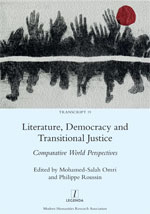Literature, Democracy and Transitional Justice
Comparative World Perspectives
Edited by Mohamed-Salah Omri and Philippe Roussin
Click cover to enlarge Buy hardback at: Booksellers & libraries: | Transcript 19 Legenda 10 December 2022 • 294pp ISBN: 978-1-781883-74-7 (hardback) • RRP £85, $115, €99 ISBN: 978-1-781883-77-8 (paperback, forthcoming) ISBN: 978-1-781883-80-8 (JSTOR ebook) Access online: Books@JSTOR When a society emerges from authoritarian rule, and the State no longer claims a monopoly on the truth, writing becomes essential – in representing rights, calling for justice, staking claims and counter-claims over what has happened, testifying to abuse, directing collective memory, or simply resisting amnesia. Such writing is a key element of Transitional Justice, whose juridical and historical origins lie in the Nuremberg trials of 1945-46, and which has since become increasingly important in former colonies and emerging democracies. Truth and reconciliation commissions are now able to hear narrative evidence of a kind which no court would previously have considered. This multi-disciplinary collection of essays focuses on the comparative study of literatures and testimonies written in the wake of violence and on their role in the aftermath of conflict. Scholars from the fields of literary studies, history, art, politics and philosophy engage with each other, and with case studies ranging across the world: from Algeria, Argentina, Columbia, Portugal, Rwanda, Spain, South Africa, Syria, Tunisia, Taiwan and the former Yugoslavia.
Contents:
Bibliography entry: Omri, Mohamed-Salah, and Philippe Roussin (eds), Literature, Democracy and Transitional Justice: Comparative World Perspectives, Transcript, 19 (Legenda, 2022) First footnote reference: 35 Literature, Democracy and Transitional Justice: Comparative World Perspectives, ed. by Mohamed-Salah Omri and Philippe Roussin, Transcript, 19 (Legenda, 2022), p. 21. Subsequent footnote reference: 37 Omri and Roussin, p. 47. (To see how these citations were worked out, follow this link.) Bibliography entry: Omri, Mohamed-Salah, and Philippe Roussin (eds). 2022. Literature, Democracy and Transitional Justice: Comparative World Perspectives, Transcript, 19 (Legenda) Example citation: ‘A quotation occurring on page 21 of this work’ (Omri and Roussin 2022: 21). Example footnote reference: 35 Omri and Roussin 2022: 21. (To see how these citations were worked out, follow this link.) This title is distributed on behalf of MHRA by Ingram’s. Booksellers and libraries can order direct from Ingram by setting up a free ipage® Account: click here for more. Permanent link to this title: www.mhra.org.uk/publications/Literature-Democracy-Transitional-Justice www.mhra.org.uk/publications/t-19 | ||||||||||||||||||||||||||||||||||||||||||||||||||||||||||||||||||||||||||||||||||||||||||||||||||||||||||||||||||||||||||||||||||||||||||||||||


